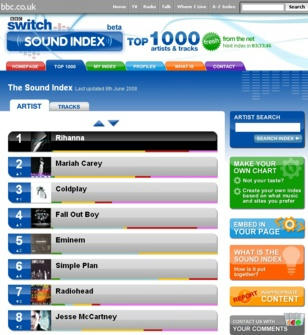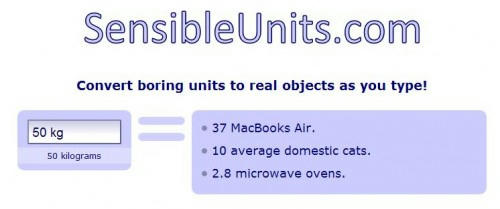- BBC Sound Index - The BBC Sound Index is a massive online index of the hottest music tracks artists on the Internet. Want to find what are currently most popular songs and artists on the web? The Sound Index is the right place.
Once every six hours the Sound Index scans major music and social networking sites including MySpace, Last.FM, iTunes, and YouTube - to build top 100 (actually top 1000) music chart. The more blog postings, views, plays, downloads, comments etc. an artist or track has, the higher it appears on the Sound Index. Therefore, what you get on the Sound Index is a top 100 music chart determined entirely by web users.
Other features include:
- the option to watch listed music videos on Youtube
- and search feature that lets you check whether the artist or track is on the chart. [via MakeUseOf]
- Youtube Catcher - Now that you know about Sound Index I am sure many of you would like to download some of those top 100 music videos to your computer. Youtube Catcher is one of the websites that can help you with that.
The only thing to keep in mind here is how you want to keep and watch these videos. If you have a flash video player installed then you have nothing to worry about. On the other hand, if you don't have it and still want to watch downloaded videos on your PC or maybe transfer them to your mobile device then you should use something like vConvert instead. With vConvert not only can you download videos but also choose in what format you want them so that they can be watched in Windows Media Player, Quicktime, iPod, mobile, etc. [via MakeUseOf]
- Google Shows Real-Time Stock Data
Starting this week, Google shows real-time price data for all NASDAQ stocks, informs Google Finance Blog. Google partnered with CNBC, Wall Street Journal, Xignite and managed to convince NASDAQ that providing free access to real-time stock data is the right thing to do. "With universal access to the Internet and the real-time nature of the web, investors need real time data, and now they don't have to pay for it," said Adena Friedman, Executive Vice President at NASDAQ.
Until today, the information was delayed at least 15 minutes and you had to subscribe to financial sites like Bloomberg to get real-time data. "It's important to have up-to-date market data. It's equally important that that data stay up to date. Consequently, we're enabling the streaming of quotes across Google Finance. Prices will update automatically, once per second, to reflect current market conditions," mentions Google.
The real-time data is available at Google Finance (not yet in the charts), in the financial OneBox, but also at CNBC.com, WSJ.com, MarketWatch.com and Barrons.com. Google Finance shows stock prices in the title, so you can open Google Finance in a new window and minimize it to see the latest updates in the status bar.
- Master the Google - Search Like a God & Save Time
The internet, a network spanning the globe. Today around 20% of the world's population is connected. That's over 1.4 billion people, a number with ten digits and it's growing. Imagine each of these individuals would contribute only one sentence per day and one file per week.
And now think again. How realistic is that? How many sentences and files do you put online on an average day? Does that put Google's name choice into perspective? Google is said to be named after the number googol, i.e. 10100, a one followed by 100 zeros. It's funny how back then they obviously didn't care about the correct spelling, and today the verb google is found in many contemporary dictionaries.
Either way, it's hard to imagine how much information is out there, yet a lot of it is at your fingertips. You just have to search right. Here are some tips to optimise and streamline your Google searches, and furthermore a handful of tricks that will save you time.
(1) Fine Tune
Operators are functional words or signs that tell the search engine how to connect or separate the given search terms. The most important ones are.
-
AND or
With "AND" or " " you can link words, so all linked terms are included in the search results. I'm adding this to give a complete collection. Google automatically searches for all given terms.
Example: sun AND moon or sun moon
Note the "AND" must be in caps and there is no space after the " ". -
OR or |
Use these to search for either term.
Example: sun OR moon or sun | moon
Note that again "OR" must be in caps, but in this case there is a space after the "|". -
" "
Putting terms in a quote indicates a sentence and will be searched for exactly in this composition.
Example: "the sun lights up the moon" -
-
The minus indicates that the following word or quoted set or words will be excluded from the search results.
Example: sun -moon or sun -"moon and stars"
Note that there is no space after the "-" -
*
This is the so called wildcard. The asterisk represents a missing word, use it to let Google fill in any potential word.
Example: "the * lights up the moon" -
~
To search for all synonyms of a word, put a tilde directly in front of it.
Example: ~sun
This search will bring back results containing the terms sun, solaris, solar, and a couple less obvious ones. -
..
The double dot put directly between two numbers denotes a range to narrow the results down.
Example: "solar eclipse 1990..2005?
Note that there are no spaces between the numbers or the dots. -
Advanced Search
If you have a hard time remembering all of these operators, use Google's Advanced Search .
(2) Narrow Down
Let Google do a search for more specific content. Google will exclude vast parts of information and dig deeper, if you tell it where to look or what to look for. And these are the operators you will need to know for that purpose:
-
site:
Search a specific site only. Very useful if that page doesn't provide an in-site search.
Example: site:makeuseof.com "Master the Google" -
cache:
A clever operator to use if you suppose a page has changed or if it's not currently available. Search for cached site versions within the Google Cache.
Example: cache:http://www.makeuseof.com -
inurl: _ intitle: _ intext: _ inanchor:
Those will search terms within any URL, title, text or anchor text, respectively. You can define several terms and combine with any other operator. If you add an "all" in front of either of these operators, all given terms have to appear in the respective query.
Example: intext:makeuseof.com google -maps OR allintext:makeuseof google maps
Note that these are not the same as the site: operator. The in. operators will search all sites containing the given terms. -
link:
This one will find pages that link to a given URL.
Example: link:makeuseof.com -
define:
The smart way to search for definitions across the web.
Example: define:Googol -
related:
Let's say you love MUO and would like to find related pages, try this operator!
Example: related:http://www.makeuseof.com -
info:
Get all the information Google has on a specific website in one search. That is links to Google Cache, similar pages, and more.
Example: info:makeuseof.com -
filetype:
Quite obviously a way to search only for one type of file. Works with pdf, ppt and doc.
Example: filetype:pdf "Sun and Moon" -
music:
A search with this operator will bring back artist, album and song information. The results are not always complete, so be careful.
Example: music:tina turner -
movies:
The search for movie reviews.
Example: movie:indiana jones -
Q&A
Google Q&A applies an AI engine to find answers to simple questions.
Example: What is the population of China?
[via MakeUseOf]
- Convert Boring Units to Real Objects
1000 Kilogram are 1.3 cows, 5.6 female lions or 1 shire horse while 100000 kilogram equal 18 male African elephants and 7.1 Big Bens. The website Sensible Units (via Genbeta) converts boring units like Kilogram, Meters, Miles or Pounds into real world objects. There is obviously no real scientific value behind the calculations but it is still interesting to discover how some units convert into real objects.
Currently only units of length and mass are converted into real objects but the developers promise to add additional units in future versions. The conversions are displayed immediately on the website which means everything takes place on the same page. The script lets you know if it cannot find any real world object of that size; Don't give up at that point, you might be surprised that it will most likely find objects for larger values again.
Pure entertainment, what do you think ? [via gHacks]







No comments:
Post a Comment